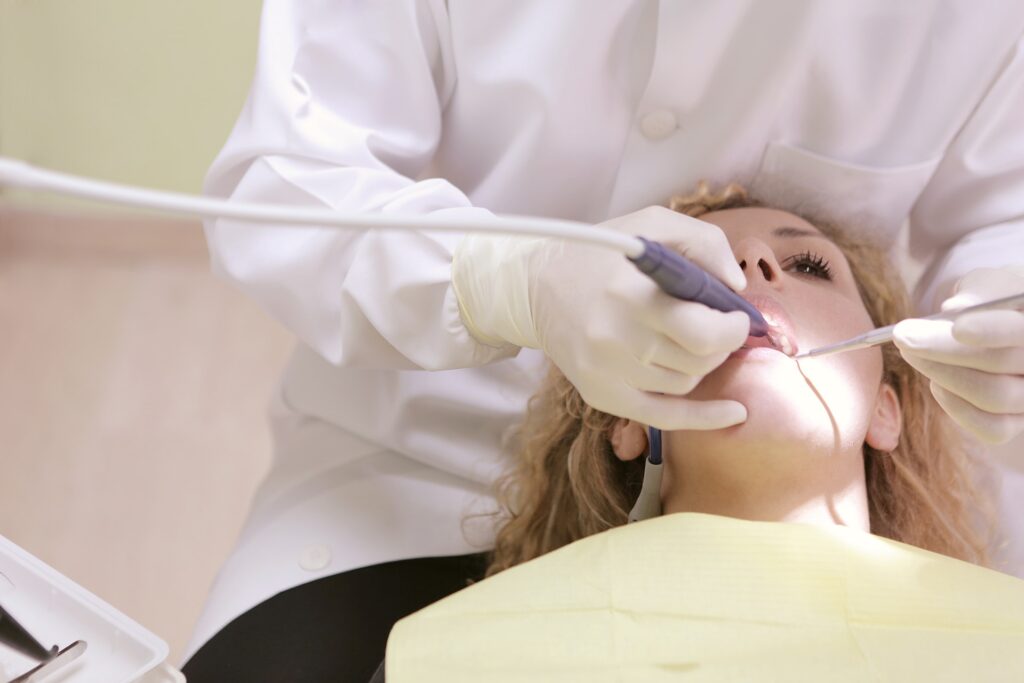The Cleveland Clinic reports that 36% of Americans have a fear of the dentist. A subsection of that amount suffers from dentophobia and avoids going to the dentist altogether. Although the dentist’s office can be a daunting chore, maintaining your oral health is an important part of your overall care.
Experts have begun experimenting with hypnotherapy as a way to alleviate patient’s fear around dental appointments. Keep reading to learn more about hypnotherapy and how you can use it to manage dental anxiety.
What Is Dental Anxiety?
Also known as odontophobia or dentophotbia, dental anxiety is the fear people may experience when they think about or need to visit the dentist. Although this may sound like something you outgrew as you got older, dental phobia is crippling for many. The fear of dental procedures can lead people to avoid visiting the dentist, even when they are in significant pain or discomfort. This can create a vicious cycle wherein the longer the person foregoes treatment, the more intense their anxiety becomes about dental appointments. Dental anxiety can also make it challenging for dentists to provide quality care.

You aren’t alone, being afraid of the dentist is an incredibly common fear that people of all ages can experience. Once this severe anxiety becomes debilitating, it is referred to as dentophobia or odontophobia.
If you suffer from dental anxiety, you may experience shaking, clamminess, and even nausea when you think about an impending dentists’ appointment. This perpetual discomfort forces may force people like you to just avoid the dentist altogether.
The root of your dental anxiety can be due to previous bad experiences at the dentist or an overarching fear of needles, pain, sedatives or anesthesia or injection. Typically, people who suffer from dental anxiety, also have a discomfort with loss of control or medical procedures as a whole.
How common is dental anxiety?
Dental anxiety is a fairly common condition, affecting a significant number of people worldwide. Studies show that up to 20% of individuals have some level of dental anxiety or fear, which can range from mild to severe.
However, it’s important to note that this dental fear can be managed with the help of a qualified health professional and various coping techniques such as hypnotherapy.
Why Do You Need to See a Dentist
You need to go see a dentist regularly, even if you have fear of the dentist. For maintaining good oral health, routine dental exams are crucial. There are several reasons why seeing a dentist regularly is vital. However, if you are someone who experiences dental anxiety, the very thought of going to see the dentist can be enough to trigger panic attacks.

Some people may experience gagging when they sit in the dental chair, which can make it difficult for dentists to provide quality care. In addition, those with dental anxiety may have an increased heart rate and blood pressure during their appointment, which can lead to fainting or feeling dizzy.
Nevertheless, it is important to find ways to overcome your dental phobia so that you can maintain good oral health and general health overall.
Preventative Care
Any steps or interventions performed to lower the chance of developing health issues are referred to as preventive care. This type of care focuses on maintaining good health, rather than simply treating illnesses. A proactive approach can help you mitigate any dental issues.
With routine exams, dental problems can be prevented. During your visit, the dentist can identify any potential issues and recommend treatment before they get worse. Cavities, gum disease, tooth loss and oral cancer are just a few of the dental issues that can be avoided with regular exams.
Professional Cleaning
A professional cleaning can help improve your oral hygiene. It can be challenging to get rid of all of the plaque and tartar buildup on your teeth, even with routine brushing and flossing. By removing these deposits, a professional cleaning can help prevent tooth decay and gum disease.
Early Detection
In their early stages, several dental conditions, such gum disease and oral cancer, may not show any overt signs. The earlier these problems are found and treated, the easier they are to resolve. If these health issues go undetected, they can cause you serious long-term health implications.
Overall Health
Overall health and dental health are closely linked. Poor oral health increases the likelihood of diabetes, heart disease, and stroke. To maintain good oral health and avoid these problems, you should have routine dental exams.
It is widely recommended that you see the dentist every six months for a regular checkup and cleaning. However, your dentist may recommend more frequent visits depending on your individual needs.
Dealing with Odontophobia: What are your options?
Tips for Overcoming Dental Anxiety:
There are a number of ways that you can work to overcome your dental phobia and make going to the dental office more bearable.
Some people may find it helpful to listen to music or audio books during their appointment as a way of distraction. Others may prefer to watch television in the dental chair instead. If you have extreme anxiety, a sedative may be an option for you. Sedation dentistry uses medication to help patients relax during dental procedures. Another option is cognitive behavioral therapy, which can help you change your thoughts and behaviors around dental visits.

Your dental practice may also recommend relaxation techniques such as meditation, deep breathing or visualization exercises to help reduce your anxiety.
Hypnotherapy can be another option for some people, as it can help reframe how you think about going to the dentist. It is important to discuss all of your options with your dentist and find the approach that works best for you. Dental anxiety is common, but taking care of your oral health is vital for your overall well-being. Don’t let fear hold you back from receiving necessary dental care.
What Is Hypnotherapy and How Can It Help With Dentophobia?
Medical experts have accepted hypnotherapy as a helpful way to manage dental anxiety. Hypnotherapy is a type of alternative therapy that uses hypnosis to induce a trance-like state in which a person becomes more relaxed and open to suggestions. During the session, a trained hypnotherapist will guide you through visualization exercises that help you feel more comfortable and confident about going to the dentist.

Many people who suffer from dental anxiety find hypnotherapy to be a safe and effective way to manage their fears. It can help you reframe negative thoughts and beliefs about dental visits, and teach you coping strategies for managing anxiety in a dental setting.
Hypnotherapy is a safe and effective option to help you reduce dental anxiety without the unwanted side effects of sedatives. Before trying hypnotherapy or any other alternative therapy, be sure to discuss it with your dentist and a qualified healthcare professional. With the right approach, you can overcome your fear of the dentist and receive the oral care you need to stay healthy. Remember, taking care of your teeth and gums is an essential part of maintaining good overall health.
Fear of the Dentist: How Does Hypnotherapy Work?
In a hypnotherapy session, the therapist will assist you in achieving a peaceful mental state. They will do this by offering comforting and reassuring suggestions for dental operations. This can help you in picturing a pain-free successful dental experience.
Prepare for Your Session
It’s important to find a reputable and qualified hypnotherapist who specializes in dental anxiety. You can ask your dentist for a referral or do research online. To prepare for your session, it’s helpful to set specific goals for what you want to accomplish, such as feeling more comfortable during cleanings or being able to undergo a specific procedure without fear.
Prior to beginning hypnotherapy, it’s crucial that the therapist builds rapport and trust with you. They will typically outline the procedure and answer any questions you may have. This can help you feel more comfortable on your path to overcoming dental anxiety. Make sure you write down any questions or concerns you have before your session so you can discuss them with your therapist.
During the Hypnotherapy Session
You will be put into a trance condition. This is done by direct suggestion, guided imagery, and gradual relaxation. The objective is for the therapist to help you reach an ultimate state of concentration.
Once you are hypnotized, the hypnotherapist will provide positive affirmations and encouraging advice. These hypnotic suggestions will be customized based on what kind of dental procedure you have coming up.
Therapists will provide you in your hypnotic state with encouraging affirmations or visualizing success. In a hypnotic state, you can receive positive remarks like, “the dentist will help keep you healthy” or “it is good to go to the dentist”.
After your hypnotherapy session
After your session, it’s important to take note of any changes in how you feel about going to the dentist. You may find that you feel more relaxed and confident, or that you are able to tolerate specific procedures without feeling anxious. It’s also crucial to continue practicing good dental hygiene habits, as this will help maintain your oral health and reduce the need for future dental visits.
If you find that your anxiety persists despite hypnotherapy, don’t hesitate to seek additional support from a mental health professional. They can work with you on identifying the underlying causes of your anxiety and developing strategies to manage it effectively. Hypnotherapy also works great when used in conjunction with other therapies like cognitive behavioral therapy or medication.
Using Hypnotherapy to Manage Dental Phobia
Dental anxiety is a common problem for many people, but it doesn’t have to prevent you from taking good care of your teeth. Hypnotherapy can be an effective tool for managing the fear and anxiety associated with going to the dentist. By working with a trained hypnotherapist, you can learn how to relax and stay calm during dental procedures.
Hypnotherapy reshapes your attitude toward dental treatments. Therapists can help you gain a more positive perspective on dental experience and in feeling more in control of your circumstances. In addition to the suggestions given during the hypnotherapy session, therapists may also teach you self-hypnosis techniques. This will enable you to enter a relaxed state whenever you feel anxious about dental procedures.

It’s important to note that hypnotherapy is not a replacement for dental care. You still need regular check-ups and treatments to maintain your oral health. However, it can be a helpful tool in managing dental anxiety and making your visits more manageable.
If you suffer from dental phobia or anxiety, consider trying hypnotherapy as a way to manage your fears. With the help of a skilled therapist, you can learn to relax and feel more positive about dental procedures. Don’t let your fears prevent you from taking care of your oral health. Talk to your dentist about hypnotherapy and see if it might be a good option for you. Remember, a healthy life is worth overcoming your fears.
It is crucial to remember that hypnotherapy should always be carried out by a certified hypnotherapist. Contact me for a consultation and we can explore together how hypnotherapy can help you overcome your dental anxiety.
